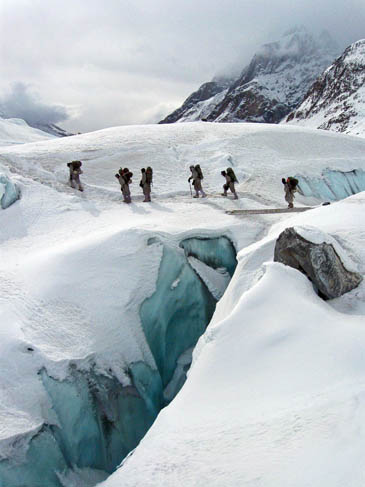Mountaineering’s international body has approved the adoption of a code of ethics covering issues as diverse as the need to aid fellow climbers in distress and care of the environment.
The Union Internationale des Associations d’Alpinisme’s general assembly met earlier this month and agreed a Mountain Ethics Declaration. The UIAA says it hopes the document will reflect the sport’s high ideals and evolve with changing times.
The general assembly met in Porto, Portugal, and agreed the document, which will guide climbers, mountaineers and alpinists.
British climber Doug Scott, defeated candidate for the British Mountaineering Council’s presidency, was a key player in drawing up the code. He said: “The Mountain Ethics Declaration, the updated statement on best practices in mountaineering, is very timely, especially to help those climbers in areas where there is no strong consensus of opinion as to the best way forward.”
New Zealand mountaineer John Nankervis, who worked with Doug Scott on the document, said: “We are living in times of rapid change, not least the advance of commercialism into many areas of human activity and pressures on the mountain environment from developments of many kinds.
“It is important therefore to impart to new generations of mountaineers the inspiration and values of past mountaineers. Indeed principles and standards might change over time but an awareness of the traditional values of the sport is needed, now more than ever.”
Doug Scott is an advocate of respect for cultural ideals in mountaineering areas and founded Community Action Nepal to help the Himalayan villagers who live in the mountain areas in the shadow of Everest. He and Dougal Haston completed the first ascent of the south-west face of Everest in an expedition led by Sir Chris Bonington.
Other issues covered by the declaration include the use of supplementary oxygen and doping in mountaineering. Even more contentious is the perceived lack of compassion by climbers on commercially organised summit attempts, including the death in 2006 of British mountaineer David Sharpe on Everest, with claims that his life could have been saved if others on the mountain had abandoned their summit bids to help him.
The Mountain Ethics Declaration is due to be published at the end of 2010 after final editing.
The UIAA was founded in 1932, first as a European organisation, but now with all continents represented, with 82 member organisations from 57 different countries. The UIAA is recognised by the International Olympic Committee as the international federation for mountaineering.

![[CC-2.0]](/lib/img/layout/cc-attr.gif)